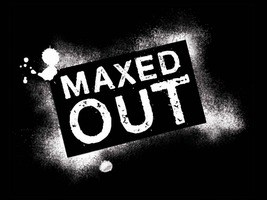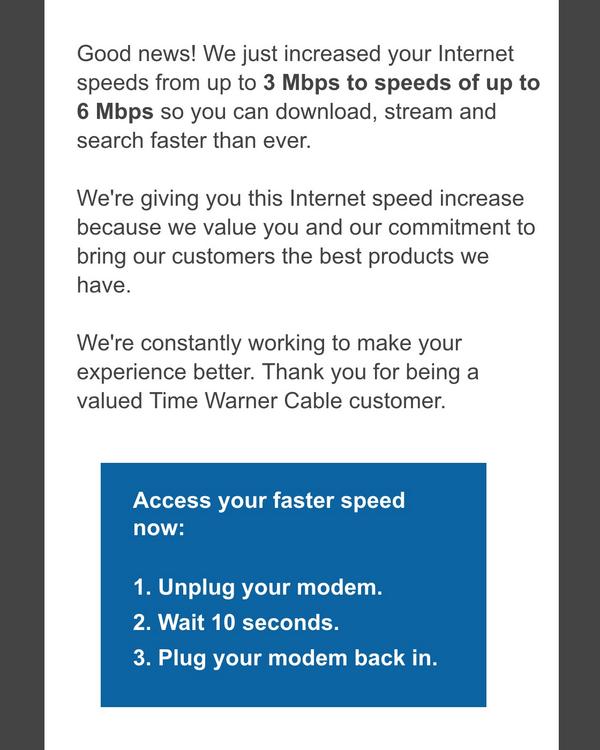 It’s a Merry Christmas from Time Warner Cable, with rate increases for one and all!
It’s a Merry Christmas from Time Warner Cable, with rate increases for one and all!
The cable company that usually waits for the holiday season to end before sending out annual “rate adjustment” notices got an early start this year with some dramatic price changes for many customers, with further rate hikes likely to follow later in 2015.
Taking a lead from Comcast, Time Warner Cable is hiking its broadband modem lease fee from $6 a month to $8 a month in January. That equals $96 a year for a modem that not too long ago used to be included at no extra charge as part of your broadband subscription. A typical customer with a Motorola SB6141 DOCSIS 3 cable modem can buy a brand new unit for nearly $20 less than what Time Warner will collect from customers each year for refurbished or used equipment… forever.
In 2013, Time Warner Cable’s Rob Marcus admitted the company does not charge modem rental fees to defray the cost of the equipment, but as a hidden rate increase designed to generate more revenue.
“The modem fee is a rate increase by all accounts, it takes a different form than usual […] it’s very much a part of the overall revenue generation program,” Marcus told an audience of investment banks.
Customers that lost analog channels after Time Warner Cable began converting part of its lineup to digital-only service were offered free Digital Adapters to continue receiving digital cable channels on older analog sets. Customers were expecting a promised $0.99 monthly lease fee for the devices starting January 1, 2015. Instead customers will now pay $2.75 a month for each DTA device, estimated to cost cable companies less than $50 each three years ago.
But the charges don’t end there.
 The Broadcast TV Surcharge for cable television subscribers will increase from $2.25 to $2.75 a month;
The Broadcast TV Surcharge for cable television subscribers will increase from $2.25 to $2.75 a month;- A new “Sports Programming Surcharge” of $2.75 a month now applies to all cable television customers, whether they watch sports channels or not;
- That on-screen program guide does not come for free. The primary outlet “discounted guide” surcharge is rising from $2.77 to $3.27 a month;
- HBO will increase from $14.99 to $16.99 a month; the Movie Pass package of Encore movie channels and certain other networks is rising $2 a month, from $5.99 to $7.99.
Part of the sales pitch Time Warner makes to justify rate increases is that broadband speeds have increased up to 100Mbps. Except they haven’t in many Time Warner Cable markets, which remain locked in with maximum speeds of 50/5Mbps for the indefinite future.
Thanks to Stop the Cap! reader Joseph for sharing Time Warner’s letter with us.


 Subscribe
Subscribe
 Time Warner Cable has
Time Warner Cable has  While Time Warner Cable customers have seen the company’s top premium speed stagnate at 50/5Mbps in many parts of upstate New York, South Carolina, western Ohio, and Maine for several years, TWC Maxx communities will see Standard Service speeds start at 50Mbps and rapidly increase from there. The differences in speed and price paid for broadband in Maxx markets vs. non-Maxx markets is staggering.
While Time Warner Cable customers have seen the company’s top premium speed stagnate at 50/5Mbps in many parts of upstate New York, South Carolina, western Ohio, and Maine for several years, TWC Maxx communities will see Standard Service speeds start at 50Mbps and rapidly increase from there. The differences in speed and price paid for broadband in Maxx markets vs. non-Maxx markets is staggering.
 In the Netherlands, having access to two broadband competitors isn’t enough to guarantee broadband competition, and Dutch telecom regulators are not about to deregulate Internet service in the country until consumers have more choices for broadband access.
In the Netherlands, having access to two broadband competitors isn’t enough to guarantee broadband competition, and Dutch telecom regulators are not about to deregulate Internet service in the country until consumers have more choices for broadband access.
